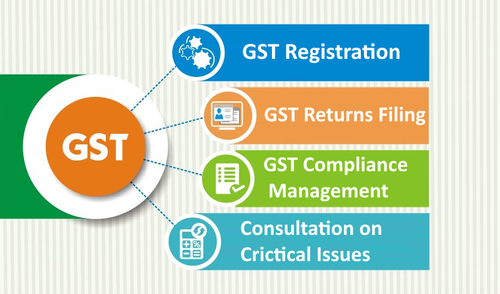Optimizing Tax Obligation Efficiency: Professional Tips on Browsing the GST Registration Labyrinth for Tiny Services
Navigating the intricate landscape of Item and Solutions Tax (GST) enrollment can be a labyrinthine job for tiny companies intending to maximize their tax obligation effectiveness. In this discussion, we will certainly check out professional insights and actionable suggestions that can empower tiny companies to browse the GST registration puzzle effectively and maximize their tax effectiveness.
Eligibility Requirements
Qualification demands for Small Organization GST Registration include details requirements that businesses have to meet to adhere to tax obligation regulations. To receive GST enrollment, an organization has to have an annual turn over exceeding the threshold established by the tax obligation authorities, which differs by country. Furthermore, organizations associated with inter-state supply of solutions or products, or those marketing items online, might be called for to register for GST, irrespective of their turnover. It is necessary for organizations to accurately determine their eligibility based upon these turn over limits to stay clear of fines for non-compliance. Singapore GST Registration.

Paperwork Demands
The required paperwork usually consists of proof of organization enrollment or unification, address and identification evidence of the business owner, photographs, bank account information, and evidence of the principal area of business. In addition, businesses need to supply information of their company tasks, consisting of the items or services supplied.
Aside from the required documents, businesses may also be required to submit additional information based upon their details conditions. This can consist of records connected to partnerships, the permission of notaries, or any other relevant agreements. Keeping all necessary documentation arranged and readily easily accessible can enhance the registration process and help businesses abide by the needs successfully - Singapore GST Registration. Failing to supply the needed paperwork may result in hold-ups and even rejection of the GST registration application. Thorough focus to information and adherence to the paperwork standards are crucial for a successful GST enrollment process for tiny organizations.
Timing Factors To Consider
Thinking about the crucial documentation demands have been thoroughly dealt with, the following crucial facet for local business embarking on the GST registration procedure is the strategic administration of timing factors to consider. Timing plays a critical function in GST enrollment, impacting not only conformity yet also monetary facets of business. Small companies need to thoroughly intend the timing of their GST enrollment to maximize benefits and reduce possible risks.

In addition, businesses should straighten the timing of their GST enrollment with their functional preparedness. Sufficient preparation, such as updating accounting systems and training staff, is important to effortlessly incorporate GST demands into day-to-day operations. By purposefully taking care of timing factors to consider, small businesses can browse the GST enrollment process efficiently and maximize their tax obligation performance.
Registration Refine Tips
Effectively navigating the GST enrollment process requires small companies to execute tactical and aggressive enrollment procedure ideas. One essential pointer is to make certain all essential papers are conveniently available prior to starting the registration procedure. This consists of business enrollment documents, proof of address, financial institution statements, and recognition proofs of business owners. Verifying the precision of the info provided is similarly vital to stop beings rejected or hold-ups.
Additionally, recognizing the thresholds and demands for GST enrollment based on check that the particular state or area where business operates is necessary. Some states have various turnover limits that trigger compulsory enrollment, so being educated regarding these limits can help companies prepare in advance.
An additional beneficial tip is to take into consideration looking for professional assistance from accountants or tax specialists who concentrate on GST registration. Their know-how can improve the procedure, minimize mistakes, and make sure conformity with all regulations.
Conformity Ideal Practices
Browsing the GST enrollment process her response smoothly necessitates not just calculated enrollment process ideas but likewise diligent adherence to conformity ideal techniques to make sure continuous regulatory placement. Small services need to prioritize conformity to avoid charges and maintain an excellent standing with tax obligation authorities. One vital finest method is to keep precise and comprehensive records of all transactions. This consists of billings, invoices, and other economic papers that may be required for tax obligation audits or compliance checks. Additionally, remaining notified about any kind of modifications or updates to GST guidelines is important. If required to guarantee they are meeting all requirements, little organization proprietors must regularly evaluate government standards and seek expert advice. Singapore GST Registration. It is additionally recommended to submit GST returns on schedule to avoid late costs and charges. By incorporating these compliance ideal practices right into their operations, small companies can browse the intricacies of GST registration with self-confidence and performance.
Final Thought
Finally, small companies can navigate the GST registration see this here labyrinth by ensuring they satisfy qualification criteria, gather required documentation, consider timing implications, follow registration procedure pointers, and stick to conformity ideal techniques. By taking full advantage of tax effectiveness with appropriate GST registration, companies can enhance their financial monitoring and procedures.
Browsing the complex landscape of Product and Provider Tax (GST) registration can be a labyrinthine job for tiny services aiming to maximize their tax obligation performance.Qualification demands for Small Company GST Registration incorporate details standards that services should meet to comply with tax regulations. The called for documents commonly consists of evidence of company registration or identity, incorporation and address evidence of the organization proprietor, pictures, bank account details, and evidence of the principal area of company. Additionally, services need to give details of their organization activities, consisting of the services or products supplied.Effectively browsing the GST registration procedure requires little organizations to carry out proactive and calculated registration process pointers.